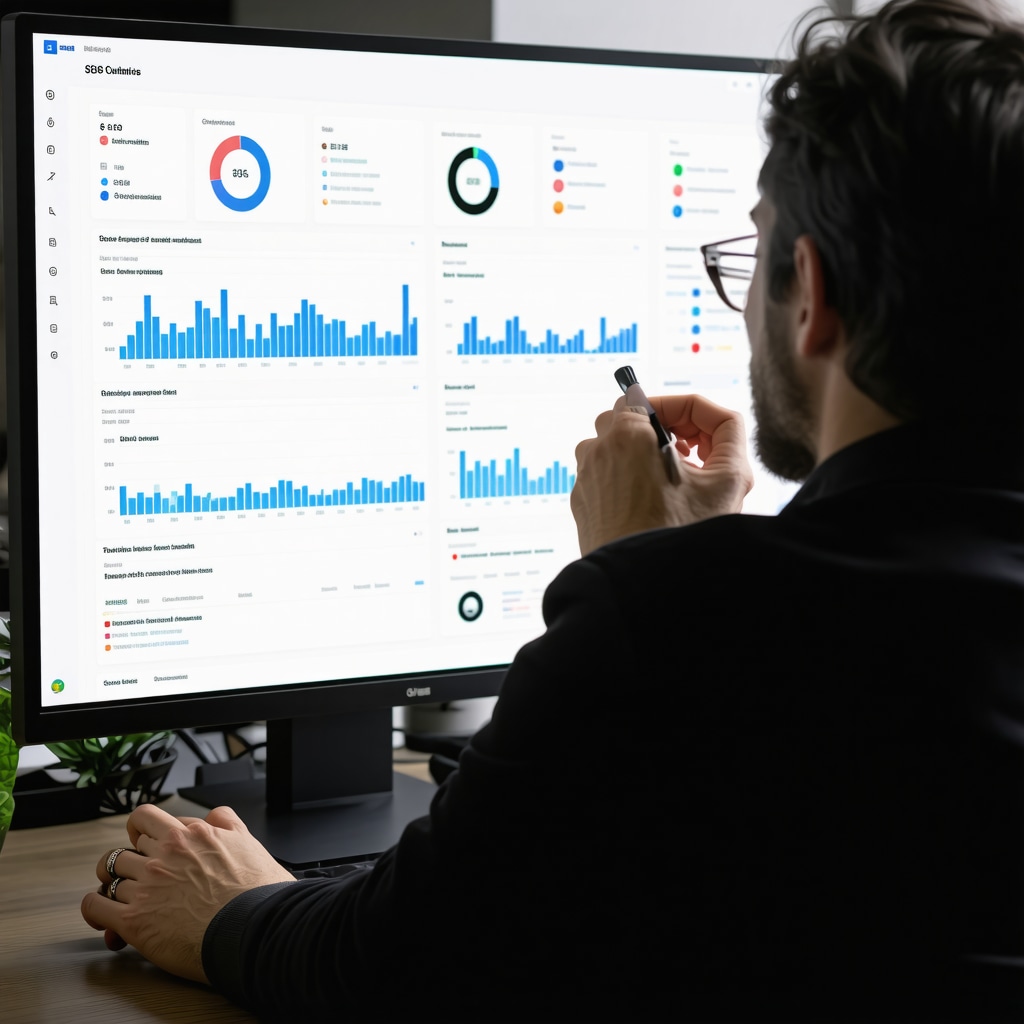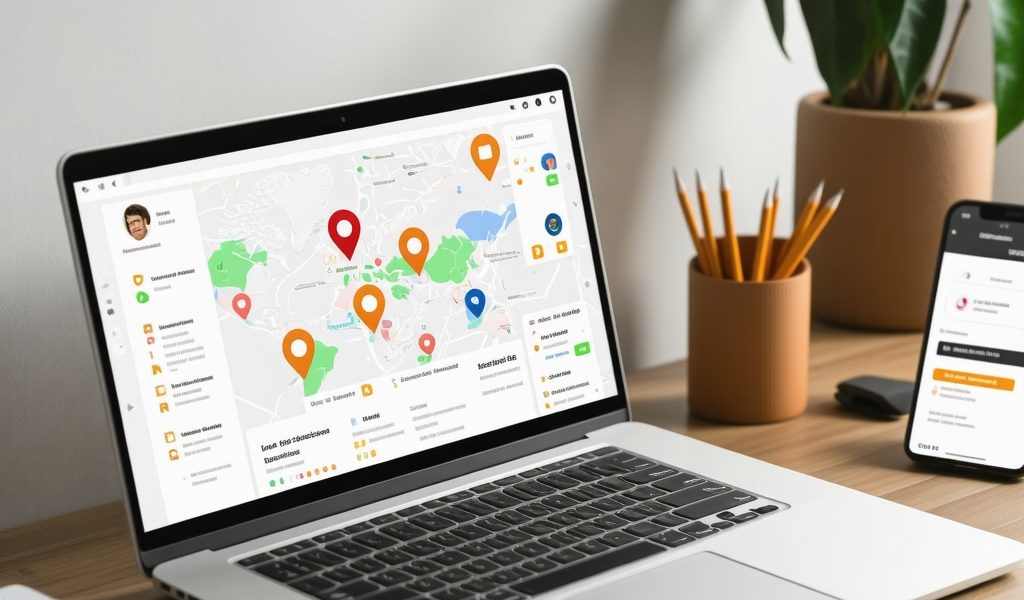Unlocking the Power of GMB Citation Management for Dominating Local SEO
In the fiercely competitive arena of local search, mastering Google My Business (GMB) citation management emerges as a pivotal strategy for elevating your business’s visibility and credibility. As an SEO specialist with years of field-tested expertise, I recognize that a meticulous, data-driven approach to citations can significantly influence your position in local pack rankings, especially when integrated with a broader local SEO optimization framework.
Why Is Citation Consistency the Cornerstone of Local Search Authority?
Consistency in NAP (Name, Address, Phone Number) data across all online directories, review platforms, and social profiles is not merely a best practice—it’s an essential element that search engines interpret as a sign of trustworthiness and authority. Inconsistent citations, whether due to typographical errors or outdated information, can dilute your local relevance signals and impair your rankings. A systematic citation audit, leveraging advanced tools and manual verification, ensures that your local business listings are uniform and accurate, facilitating improved local search performance.
How Does Citation Volume and Quality Interact to Influence Local Rankings?
While volume of citations can enhance your local SEO footprint, the quality of these citations—meaning authoritative, relevant, and well-maintained listings—exerts a more profound impact on ranking algorithms. Focus on securing listings on high-trust platforms like Yelp, TripAdvisor, and industry-specific directories, which act as trust signals for Google. Regularly updating and optimizing these listings with rich, keyword-optimized descriptions further amplifies your local relevance. For in-depth tactics, consult our guide on GMB content and review strategies.
What Are the Challenges in Managing Citations at Scale?
Scaling citation management involves complex challenges such as maintaining data accuracy across hundreds of platforms, handling duplicate listings, and monitoring citation health over time. Implementing a centralized citation management system—preferably integrated with a professional SEO agency—can streamline this process. Additionally, leveraging automated tools like BrightLocal or Moz Local ensures ongoing citation consistency, vital for sustained local SEO dominance.
How Can I Identify and Correct Citation Discrepancies Without Losing Local Rank Momentum?
Detecting and rectifying citation discrepancies requires a strategic combination of automated audits and manual verification. Prioritize high-impact platforms, resolve duplicate listings, and update outdated information promptly. Regularly tracking your citation health through analytics tools can prevent minor inconsistencies from escalating into ranking setbacks. For actionable insights, explore our detailed tutorial on review management and citation accuracy.
Engaging with local SEO experts and contributing your insights to community forums can further refine your citation strategy. Remember, citation management is not a one-time task but an ongoing process essential for maintaining local dominance.
For a deeper dive into citation strategies and how they integrate into your overall Google Business Profile optimization, explore our comprehensive resources or contact us for tailored solutions.
Harnessing the Latest Tools for Citation Data Accuracy and Scalability
As local SEO evolves, leveraging cutting-edge tools becomes imperative for maintaining citation integrity at scale. Modern platforms like expert citation management services integrate AI-driven verification and real-time updates, drastically reducing human error and saving time. These tools enable businesses to monitor citation health continuously, identify duplicate listings, and correct inconsistencies proactively, ensuring your NAP data remains pristine across all directories and platforms.
Why Is Citation Data Freshness Critical in a Competitive Landscape?
In an environment where local competitors are constantly optimizing their profiles, the freshness of your citation data can be a game-changer. Outdated or stale information not only hampers rankings but also erodes customer trust. Regularly updating your citations with current information and optimized keywords, especially on high-authority sites like Google Business Profile, can significantly enhance your local relevance signals. Consider integrating automated workflows that sync your data with CRM systems to ensure real-time updates across all touchpoints.
What Are the Hidden Pitfalls in Large-Scale Citation Management?
Despite the availability of sophisticated tools, many businesses fall into common traps such as neglecting duplicate detection, ignoring citation consistency, or failing to address platform-specific data requirements. These oversights can dilute your local authority and impede your ranking efforts. A nuanced understanding of platform nuances—such as schema markup requirements or local review signals—can prevent these pitfalls. For a comprehensive approach, consult our guide on local review strategies.
How Can I Implement a Data-Driven Citation Strategy to Outperform Competitors?
Implementing a data-driven, iterative citation strategy requires detailed analytics that track citation performance, consistency levels, and impact on rankings. By analyzing competitor citation profiles and identifying gaps, you can prioritize high-value platforms and tailor your outreach efforts. Employing advanced analytics tools helps refine your approach continuously, ensuring your citations contribute meaningfully to local pack dominance. For actionable insights, explore our content and review optimization tactics.
Engaging with local SEO experts and participating in industry forums can also provide fresh perspectives and innovative tactics, keeping your strategy ahead of the curve. Remember, the most successful local SEO campaigns are those that adapt swiftly to changing algorithms and market dynamics.
To deepen your understanding of how citation management integrates with overall Google Business Profile optimization, check out our detailed resources or contact us for tailored guidance.
Leveraging Semantic Data and Schema Markup to Elevate Citation Effectiveness
While traditional citation management focuses on NAP consistency, the integration of semantic data and schema markup introduces a new frontier in local SEO. Implementing structured data on your website not only enhances how search engines interpret your business information but also amplifies the impact of your citations across platforms. For instance, utilizing Schema.org markup helps Google recognize nuanced details like service offerings, operational hours, and geographic coordinates, enriching your local profile and increasing the likelihood of featured snippets and rich results. This synergy between on-site structured data and off-site citations forms a comprehensive, data-rich ecosystem that signals authority and relevance more convincingly.
How Does Schema Markup Interact with Citation Data to Boost Local SEO?
Schema markup acts as a translator between your website’s content and search engines, providing explicit cues about your business details. When these cues align with your citations—such as consistent address formats, phone numbers, and categories—the combined effect reinforces your local relevance. Research from Moz’s local SEO study indicates that structured data implementation correlates strongly with improved visibility in local packs (Moz, 2022). By ensuring your schema data is synchronized with your citation profiles, you create a cohesive data narrative that search engines interpret as high-authority, trustworthy local signals, thereby improving rankings and click-through rates.

Implementing schema markup effectively requires technical expertise; therefore, engaging with developers or SEO specialists familiar with JSON-LD and schema integration is advisable. Regular audits using tools like Google’s Rich Results Test can verify the correctness and consistency of your structured data, preventing potential ranking penalties.
Building a Data-Driven Citation Strategy: From Gaps to Gains
Moving beyond basic citation listing, a sophisticated approach involves leveraging data analytics to identify gaps, redundancies, and opportunities within your citation ecosystem. Tools like SEMrush and BrightLocal aggregate citation data, providing insights into where your business is underrepresented or inconsistencies exist. Analyzing competitor citation profiles with these tools reveals high-value directories and niche platforms they dominate—opportunities you can capitalize on to outperform them. Additionally, integrating CRM data with your citation strategy allows for real-time updates and personalization, ensuring your citations reflect current promotions, hours, or services.
How Can I Quantify the Impact of Citation Optimization on Local Rankings?
Quantifying citation impact involves tracking key performance indicators such as local pack rankings, organic local search traffic, and review volume and sentiment. Advanced analytics platforms like BrightLocal offer dashboards that correlate citation health scores with ranking fluctuations, enabling data-driven decision-making. Implementing A/B testing—such as updating citations on select platforms and monitoring subsequent ranking changes—can provide empirical evidence of your strategies’ effectiveness. For a comprehensive approach, consider integrating your citation analytics with Google Search Console and Google My Business Insights to get a holistic view of local visibility trends.
Engaging in ongoing analysis and refinement ensures your citation strategy remains adaptive to algorithm updates and market shifts, securing your position at the forefront of local search dominance. For tailored guidance, consulting with local SEO experts can provide nuanced insights specific to your industry and geographic niche.
Harnessing Semantic Data and Schema Markup for Enhanced Citation Synergy
While traditional citation management emphasizes NAP accuracy, integrating semantic data and schema markup elevates your local SEO efforts to a new echelon. Implementing structured data on your website—such as Schema.org—not only clarifies your business details for search engines but also synergizes with your off-site citations to amplify authority signals. This approach enables your listings to appear in rich snippets, map packs, and other featured results, substantially increasing visibility and click-through rates.
How Does Schema Markup Interact with Citation Data to Boost Local SEO?
Schema markup acts as a translator, providing explicit, machine-readable cues about your business information, which, when aligned with your citations, creates a cohesive data ecosystem. Consistent address formats, phone numbers, and categories across your website schema and citations reinforce your local relevance. Moz’s 2022 local SEO study underscores that structured data implementation correlates strongly with improved local pack visibility, emphasizing its strategic importance. Regular audits using tools like Google’s Rich Results Test ensure synchronization and correctness, preventing ranking penalties and maximizing the benefits of this integration.

Engaging with developers or SEO specialists proficient in JSON-LD and schema integration can streamline this process, ensuring your structured data complements your citation profile for optimal results.
Building a Data-Driven Citation Ecosystem for Competitive Edge
Moving beyond basic listings, a sophisticated, data-driven approach involves leveraging analytics tools such as SEMrush or BrightLocal to identify gaps, redundancies, and high-value opportunities within your citation landscape. By analyzing competitor profiles, you can uncover niche directories and underserved platforms where your presence can be strengthened. Integrating CRM data ensures your citations reflect real-time updates—promotions, hours, or services—creating an adaptive, authoritative local profile that outpaces competitors.
How Can I Quantify the Impact of Citation Optimization on Local Rankings?
Quantification involves tracking KPIs like local pack rankings, organic local search traffic, and review metrics. Advanced dashboards from BrightLocal or SEMrush correlate citation health with ranking fluctuations, providing empirical insights. Experimenting with A/B tests—updating citations on select platforms and monitoring ranking shifts—can validate your strategies’ effectiveness. For a comprehensive analysis, integrate your citation data with Google Search Console and GMB Insights to monitor overall local visibility trends, enabling continuous refinement and sustained dominance.
Engaging with local SEO experts for tailored analytics and strategic guidance ensures your citation ecosystem remains resilient amidst algorithm updates and competitive pressures. Stay proactive, data-driven, and innovative to maintain your local search leadership.
Expert Insights & Advanced Considerations
1. Emphasize the integration of semantic markup with citation strategies to maximize local search relevance.
Implementing schema markup such as Schema.org on your website ensures search engines interpret your business details accurately, reinforcing your citations and enhancing visibility in local packs. This synergy between on-site structured data and off-site citations creates a robust authority signal that is difficult for competitors to replicate.
2. Prioritize high-trust directories and niche platforms that align with your industry for superior citation quality.
Focus efforts on authoritative sites like Yelp, TripAdvisor, and industry-specific directories. These platforms not only boost your citation volume but also serve as trust signals, significantly influencing your local rankings when consistently maintained.
3. Utilize advanced analytics tools to identify citation gaps and redundancies, enabling a data-driven approach to citation expansion.
Tools like SEMrush and BrightLocal offer insights into underrepresented directories and duplicate listings, allowing targeted corrections that improve overall citation health and search performance.
4. Automate citation management workflows to ensure real-time updates and consistency across platforms.
Leverage automation solutions that sync your NAP data with CRM systems and directories, reducing manual errors and maintaining citation freshness crucial for competitive local SEO.
5. Regularly audit citation discrepancies and address platform-specific data requirements to prevent ranking penalties and ensure data integrity.
Periodic audits using tools like Google’s Rich Results Test and manual verification help catch inconsistencies early, preserving your local authority and search visibility.
Curated Expert Resources
- Google’s Structured Data Guidelines: Provides comprehensive instructions for implementing schema markup that enhances local SEO.
- BrightLocal’s Citation Management Platform: Offers automated tools for citation audits, duplicate detection, and local SEO insights.
- Moz Local: A trusted resource for citation building, monitoring, and local search optimization strategies.
- SEMrush Local SEO Toolkit: Analyzes competitor citations, identifies gaps, and tracks citation impact on rankings.
- Google Search Central Blog: Regular updates on best practices for data consistency, structured data, and local search algorithms.
Final Expert Perspective
Mastering GMB citation management requires a sophisticated, data-driven approach that integrates semantic markup, authoritative directory selection, and continuous auditing. By leveraging advanced tools and industry insights, businesses can sustain a competitive edge in local SEO. Embrace these strategies to elevate your local visibility and establish enduring search authority. For deeper engagement, consider consulting with local SEO experts or exploring our comprehensive resources designed for high-impact optimization.



